The Kaba Kaba Harmony Cycling tour offers a unique opportunity to take in Bali’s serene rural landscapes and rich cultural heritage. Participants can expect to ride through picturesque rice fields, observe traditional farming practices, and visit sacred water temples – all while gaining a deeper understanding of the region’s spiritual and cultural significance. Underpinned by a commitment to sustainable tourism, this experience highlights the harmonious relationship between the Balinese people and their environment, leaving visitors with a renewed appreciation for the island’s natural beauty and the traditions that have shaped it.
Good To Know
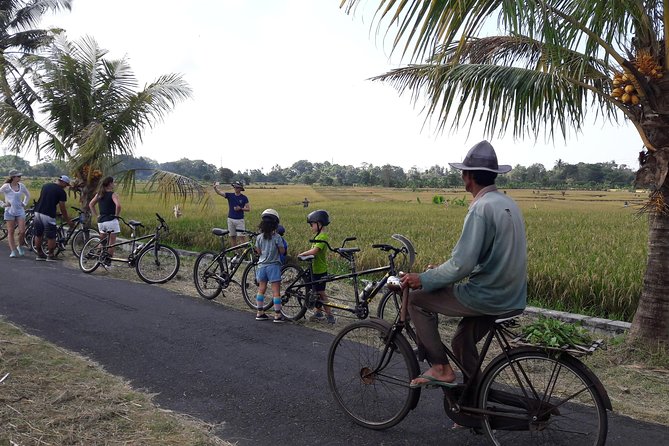
-
The Kaba Kaba Harmony Cycling tour promotes sustainable tourism by supporting the local economy and preserving the region’s natural beauty and cultural heritage.
-
The tour offers an immersive experience of Balinese rural life, enabling visitors to observe traditional farming practices and the harmony between the community and the environment.
-
Visiting sacred water temples and historic sites during the cycling tour provides a deeper understanding of Bali’s rich religious traditions and cultural history.
-
The cycling experience allows for meaningful interactions with local farmers and villagers, fostering cultural exchange and appreciation for the Balinese lifestyle.
-
The complimentary refreshments at the start of the tour create a warm and welcoming atmosphere, setting the tone for an engaging and memorable cycling adventure.
Cycling Through Bali’s Rural Landscape
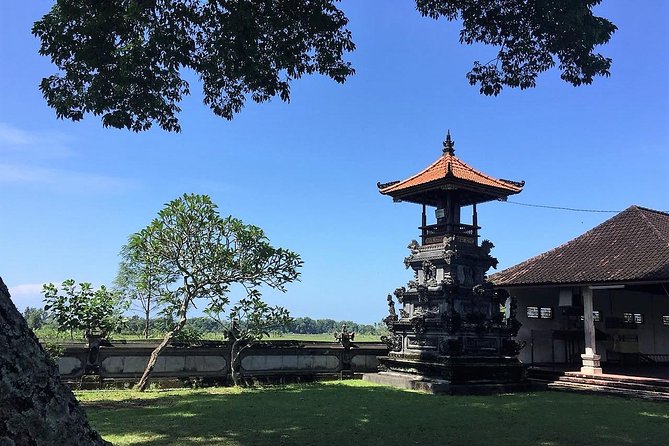
The guided cycling tour takes guests through the quiet country lanes and lush rice fields of Kaba-Kaba, a rural village in Bali.
Cyclists have the opportunity to observe local farmers at work and learn about their traditional agricultural practices. The route also includes visits to historic sites and a sacred water temple nestled amidst the rice paddies.
Along the way, participants can enjoy the serene scenery of mountains and rivers that characterize Bali’s picturesque countryside.
The cycling experience provides an immersive glimpse into the island’s rural life and cultural heritage, offering a memorable and off-the-beaten-path adventure.
Ready to pedal more of Seminyak? More cycling tours we recommend
Observing Traditional Farming Practices
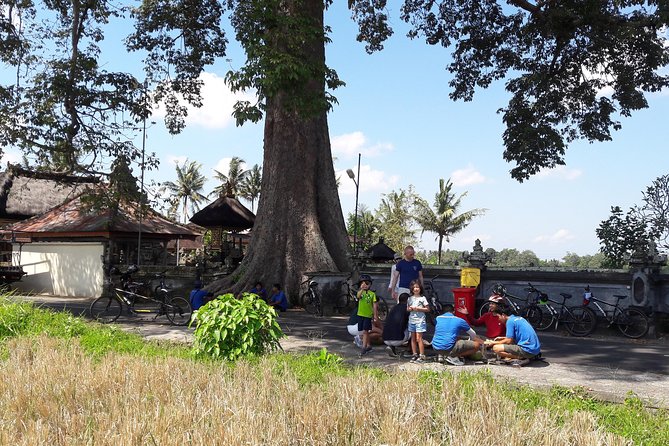
As cyclists pedal through the lush rice fields, they’re afforded a unique window into Bali’s traditional farming practices. The tour guides share insights into the region’s social organization, where farmers work cooperatively to manage water resources and cultivate their crops. Visitors can observe the intricate system of canals, dams, and subaks (water temple communities) that have sustained rice production for centuries. The experience offers a deeper appreciation for the harmony between Balinese culture and the natural environment.
| Traditional Practice | Description |
|---|---|
| Rice Cultivation | Farmers utilize terraced fields and a intricate irrigation network to grow diverse rice varieties. |
| Water Management | Subak communities collaboratively manage water distribution and maintain the temple-based irrigation system. |
| Crop Rotation | Farmers rotate between rice, vegetables, and other crops to maintain soil fertility and ecological balance. |
| Organic Farming | Many farms use traditional, sustainable methods without chemical fertilizers or pesticides. |
Visiting Sacred Water Temples
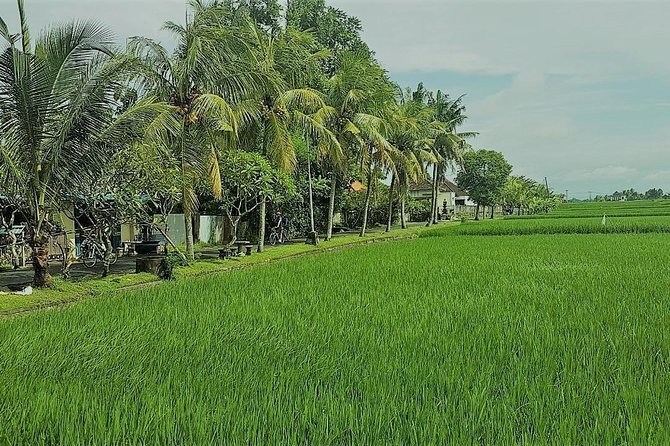
A highlight of the Kaba Kaba cycling tour is the opportunity to visit one of Bali’s sacred water temples nestled among the verdant rice fields.
During the tour, guests can explore these revered sites and learn about their cultural significance. The temples serve as important spiritual centers, where locals come to pray and perform rituals.
Visitors can witness the intricate architecture and observe the serene atmosphere as they wander through the temple grounds. This experience offers a unique glimpse into Bali’s rich religious traditions and the profound connection between the island’s people and their natural environment.
Exploring Kaba-Kaba’s Historic Sites
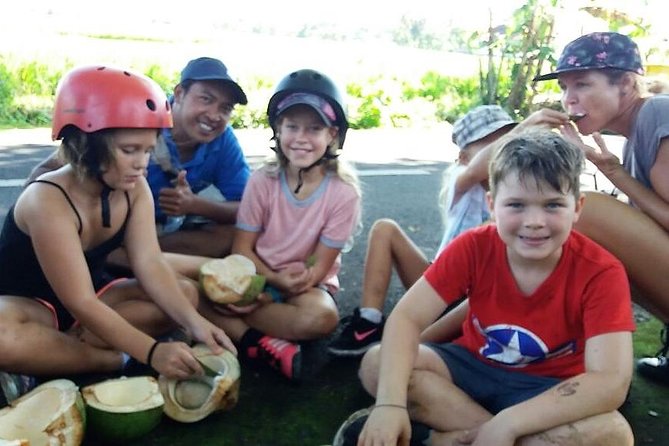
Kaba-Kaba’s historic sites offer visitors an intriguing glimpse into the region’s rich cultural heritage. Dotted throughout the lush landscapes, these ancient landmarks provide a window into the area’s storied past.
Explorers can:
- Discover centuries-old temples and shrines, each with its own captivating history
- Wander through the remnants of prehistoric settlements, uncovering clues about the lives of Kaba-Kaba’s earliest inhabitants
- Visit revered ancestral sites, where visitors can gain insights into the local community’s traditions and beliefs
- Uncover the stories behind Kaba-Kaba’s historic architecture, from ornate carvings to intricate architectural features.
These historic gems seamlessly blend with the stunning natural surroundings, creating a harmonious and immersive cultural experience for travelers.
Experiencing Balinese Social Organization
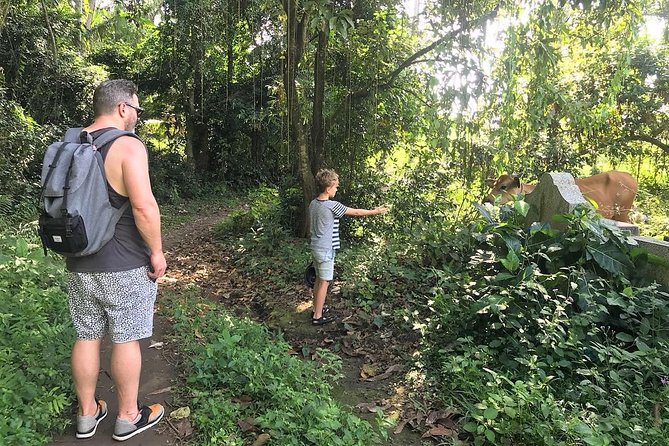
During the cycling tour, visitors are afforded a unique opportunity to gain insights into the intricate social organization that underpins Balinese community life. At a riverside break, the guide shares fascinating details about the hierarchy and responsibilities within Balinese social structures.
| Role | Responsibility | Significance |
|---|---|---|
| Banjar | Governing local community | Ensures harmony and cooperation |
| Kelian | Elected community leader | Oversees decision-making and dispute resolution |
| Prajuru | Administrative officials | Maintain order and uphold traditional values |
This deeper understanding of Balinese social dynamics enriches the cycling experience, allowing visitors to appreciate the interconnectedness that shapes everyday life in Kaba-Kaba.
Meeting Local Farmers and Villagers
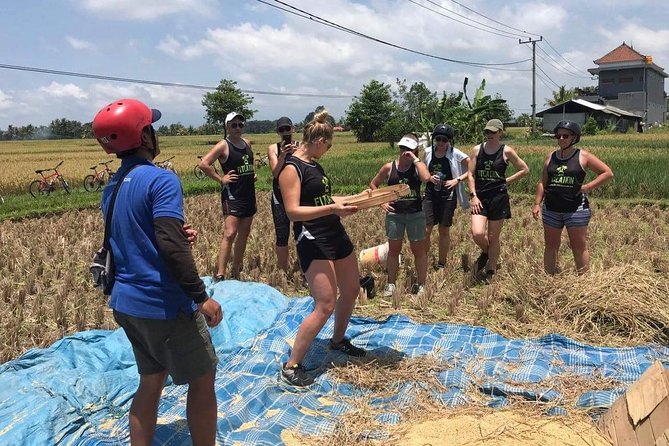
The cycling tour through Kaba-Kaba’s rural landscapes offers visitors a unique opportunity to directly engage with local farmers and villagers.
During the excursion, cyclists have the chance to:
- Observe farmers tending to their rice fields and learn about their traditional agricultural practices
- Interact with villagers and gain insights into their daily lives and community dynamics
- Visit a sacred water temple, where locals gather to perform religious rituals and maintain their cultural heritage
- Explore historic sites that reflect the region’s rich history and the harmony between its people and the natural environment
These intimate encounters allow cyclists to develop a deeper understanding and appreciation for the Balinese way of life, fostering a sense of cultural exchange and connection.
Enjoying Complimentary Refreshments
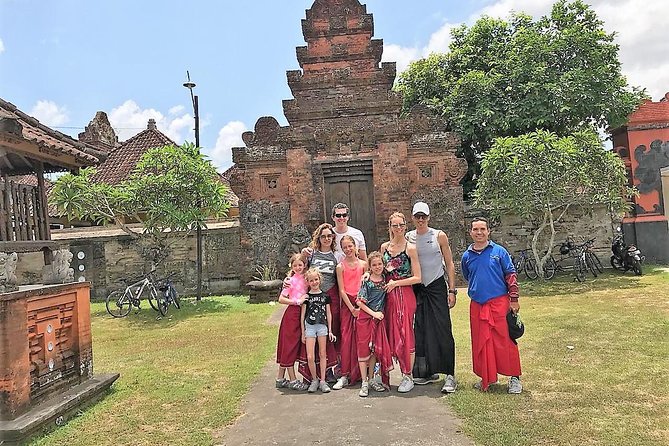
Visitors to the Kaba Kaba Harmony Cycling tour can enjoy a complimentary selection of coffee and tea upon arrival at the meeting point, Yayasan Manu Widya Narayana.
This sets the stage for a relaxing start to the day’s adventure. Guests can sip on the local brew while taking in the peaceful atmosphere of the village, preparing themselves both physically and mentally for the cycling experience ahead.
The complementary refreshments not only provide a warm welcome but also allow participants to connect with the local culture before embarking on their journey through the scenic Balinese countryside.
Importance of Sustainable Tourism
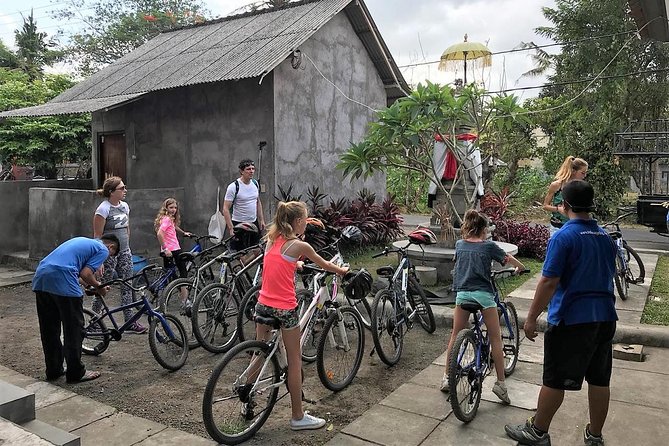
Situated in the heart of Bali’s rural landscape, the Kaba Kaba Harmony Cycling tour exemplifies the importance of sustainable tourism.
By immersing visitors in the local culture and traditions, the tour promotes cultural exchange and understanding.
The cycling experience minimizes environmental impact, while supporting the local economy through employment and revenue generation.
Sustainable tourism initiatives like this also help preserve the region’s natural beauty and rich heritage for future generations.
The tour’s responsible practices and focus on community engagement make it a model for sustainable tourism development in Bali.
- Promotes cultural exchange and understanding
- Minimizes environmental impact
- Supports the local economy
- Preserves natural and cultural heritage
Frequently Asked Questions
What Is the Minimum Age Requirement for the Cycling Tour?
The overview does not specify a minimum age requirement. However, it notes that infant seats are available, suggesting the tour may be suitable for young children. Travelers with back problems or who are pregnant are not recommended to join the tour.
Can I Bring My Own Bicycle for the Tour?
The tour company allows cyclists to use their own bicycles. However, they recommend using the provided equipment as it is well-maintained and suitable for the terrain. Bringing your own bike may not be necessary or provide any significant advantages for this particular cycling tour.
Is a Vegetarian or Vegan Meal Option Available?
The tour doesn’t explicitly mention vegetarian or vegan meal options. However, it provides complimentary snacks and breakfast, so it’s likely they can accommodate dietary preferences with advance notice. Guests should inquire about this when booking the tour.
Are There Any Discounts or Group Rates for the Tour?
The Kaba Kaba Harmony Cycling tour doesn’t offer any discounts or group rates. However, they provide complimentary coffee and tea, snacks, and all necessary bike equipment. Cancellation up to 24 hours before the experience is free.
What Is the Cancellation and Refund Policy for the Experience?
The tour offers free cancellation up to 24 hours before the start of the experience. This provides flexibility for travelers who need to change their plans. Refunds are available within this cancellation window.
Sum Up
The Kaba Kaba Harmony Cycling tour offers a unique opportunity to take in Bali’s rural landscapes and rich cultural heritage. Participants can observe traditional agricultural practices, visit sacred sites, and engage with local communities, all while supporting sustainable tourism. This experience highlights the harmonious relationship between the Balinese people and their environment, providing a deeper understanding of the region’s significance.
More Cycling Tours in Seminyak
More Tour Reviews in Seminyak
Not for you? Here's more things to do in Seminyak we have recnetly reviewed
- 3 Best Canoe And Kayak Experiences In Seminyak
- 9 Best 2 Day Tours In Seminyak
- 11 Best 3 Day Tours In Seminyak
- 2 Best Scuba Diving Experiences In Seminyak
- 5 Best Shopping Tours In Seminyak
- 24 Best Cruises And Boat Tours In Seminyak
- 7 Best Food Tours In Seminyak
- 20 Best Full-Day Tours In Seminyak
- 2 Best Jet-Ski Experiences In Seminyak
- 5 Best 4 Day Tours In Seminyak
- 2 Best Coffee Tours And Tastings In Seminyak
- 20 Best Massage And Relaxation Services In Seminyak
